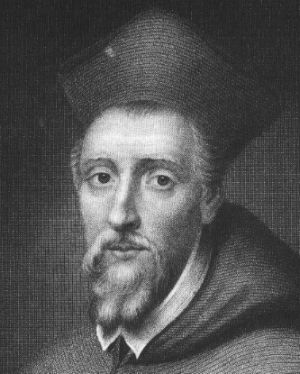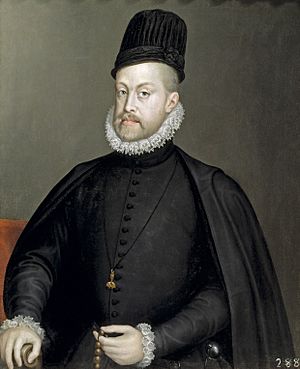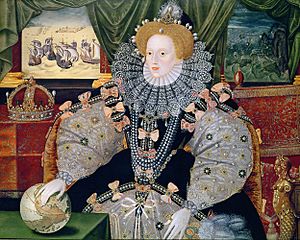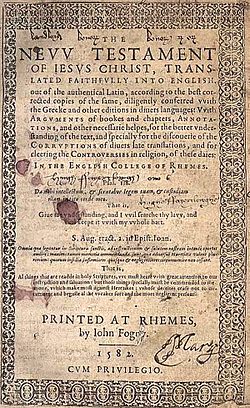William Allen (cardinal) facts for kids
Quick facts for kids His Eminence Cardinal William Allen |
|
|---|---|
| Prefect of the Vatican Library | |
 |
|
| Orders | |
| Ordination | 1565 |
| Created Cardinal | 7 August 1587 |
| Rank | Cardinal priest of Ss. Silvestro e Martino ai Monti |
| Personal details | |
| Born | 1532 Rossall (near present-day Fleetwood), Lancashire, England |
| Died | 16 October 1594 (aged 62) Rome, Papal States |
| Buried | Church of St Thomas of Canterbury at the English College, Rome |
| Nationality | English |
| Denomination | Roman Catholic |
| Parents | John Allen |
William Allen (1532 – 16 October 1594) was an important English Cardinal in the Roman Catholic Church. He was a priest, but never became a bishop. His main goal was to create schools to train English priests. These priests would then secretly return to England. Their mission was to help keep the Roman Catholic faith alive there.
Allen also helped plan the Spanish Armada's attempt to invade England in 1588. This invasion failed badly. If it had worked, he likely would have become the top religious leader in England, the Archbishop of Canterbury. He also oversaw the printing of the Douai-Rheims Bible. This was a full English translation of the Bible from Latin. His actions were part of the Counter Reformation, which was the Catholic Church's response to the Protestant Reformation. However, his work led to strong reactions in England and Ireland. He advised Pope Pius V to declare that Elizabeth I was no longer the rightful queen. After the Pope did this, Elizabeth increased her efforts against Roman Catholics.
Contents
Early life and studies
William Allen was born in 1532. His birthplace was Rossall Hall in Rossall, Lancashire, England. He was the third son of John Allen.
In 1547, at age fifteen, he started studying at Oriel College, Oxford. He earned his first degree in 1550. Then, he became a Fellow (a senior member) of his college. In 1554, he earned his Master of Arts degree. Two years later, in 1556, he became the head of Saint Mary's Hall.
Allen also worked as a priest at York Minster around 1558. This means he had started his path to becoming a priest. When Elizabeth I became queen, she made people take the Oath of Supremacy. This oath meant accepting her as the head of the Church of England. Allen refused to take it. But he was allowed to stay at the University of Oxford until 1561.
Leaving England
Allen openly disagreed with the new Protestant Church of England. This forced him to leave the country. In 1561, he left England and went to Leuven in Belgium. Many other scholars from Oxford and Cambridge who also refused the oath had gone there. In Leuven, he continued his religious studies. He also began writing books that defended Catholic beliefs.
The next year, because he was not well, he was told to go back to Lancashire. There, he worked to bring his home region back to the Catholic faith. He especially tried to convince Catholics not to attend Anglican church services. Many Catholics went to these services to avoid fines and other punishments.
During this time, Allen worked secretly in England. He became convinced that people were not against the Catholic Church by choice. He believed they were forced by the situation. He felt that most people were ready to return to Catholicism after hearing his sermons. When Queen Elizabeth's agents found out about him, he fled. He went to Oxford, where he had many friends.
After writing a book about a priest's power to forgive sins, Allen had to move again. He went to Norfolk, where the Duke of Norfolk's family protected him. But in 1565, he had to leave England for good. He traveled to the Low Countries. Soon after, he became a priest in Mechelen (Malines) in Belgium. He then started teaching religious studies at a college there.
Founding the College at Douai
Allen always believed that the Protestant changes in England would not last forever. He thought it was important to have trained priests ready to return to England. These priests would help restore Catholicism when the time came. In 1567, Allen visited Rome for the first time. There, he came up with a plan to create a college. This college would be a place where English students could live and finish their religious training.
This idea grew into a missionary college, or seminary. Its purpose was to provide England with priests as long as the split with Rome continued. With help from friends, especially Benedictine abbots, the college started. It opened in a rented house in Douai, France, on September 29, 1568. This was the beginning of the English College, Douai.
Many English exiles joined Allen, including Edmund Campion. Douai was a good choice for Allen's new college. The University of Douai had recently been founded there. Also, King Philip II of Spain supported it. Douai was part of his lands at the time. Jean Vendeville, a law professor, also strongly encouraged Allen. On January 31, 1570, Allen became a professor of religious studies at the university.
Allen's college became very important for the "English mission." This mission aimed to bring England back to Catholicism. Over 160 former students from Douai, known as "seminary priests," were executed under the Penal Laws. Many more were put in prison. Students at the college celebrated each time a former student was martyred. They even held special thanksgiving Masses.
Colleges in Rome and Rheims
The number of students at the Douai college quickly grew to 120. The Pope then asked Allen to come to Rome to start a similar college there. In 1575, Allen made his second trip to Rome. There, he helped set up the English College at Rome as ordered by Pope Gregory XIII. An old English guesthouse in Rome was turned into a seminary for missionaries going to England. Jesuit priests were placed in the college to help its leader, Maurice Clenock.
The Pope made Allen a Canon (a type of priest) in Courtray (now Kortrijk, Belgium). Allen returned to Douai in July 1576. But he faced new problems there. Besides plots by Queen Elizabeth's agents to kill him, rebels against Spanish rule caused trouble. These rebels, supported by Elizabeth, forced the university students out of Douai in March 1578.
Allen then moved the college to Rheims, France. The city was protected by the House of Guise. The students were welcomed at the University of Rheims. They continued their work as before. Allen soon became a canon in the Rheims Cathedral. Important scholars like Thomas Stapleton and Gregory Martin were among Allen's friends there.
The college's printing press produced many Catholic books. These books could not be printed in England. Allen played a big part in this. One of the main projects was preparing the famous Douai Bible. This was a translation from Latin into English. The New Testament was published in 1582 while the college was in Rheims. The Old Testament was finished at the same time but was delayed due to lack of money. It was finally printed in Douai in 1609. This was two years before the King James Version was prepared for King James by the Church of England.
Political actions
In 1577, Allen began writing letters to the Jesuit priest Robert Parsons. Allen was called to Rome again in 1579. He was asked to deal with a problem at the English College. Students from Wales and England were having disagreements. During this visit, he was also asked to help revise the Latin Vulgate Bible.
Allen met Parsons in person and was very impressed by him. Parsons became a trusted friend. Allen decided to place the English College in Rome under the control of the Society of Jesus (Jesuits). This was part of a plan to send Jesuit missionaries to England by 1580. Allen instructed the first Jesuits sent, Parsons and Edmund Campion, to work closely with other Catholic priests in England. This mission did not have much success. Campion was executed after only a year, and Parsons had to flee back to Europe.

Allen saw his work as an effort to end England's separation from Rome. However, his efforts were not successful. Some argue they made things worse for Catholics in England, Wales, and Ireland. Pope Pius V, in a special order called Regnans in Excelsis (1570), declared Elizabeth excommunicated. This meant she was no longer part of the Catholic Church. The Pope also said she was removed from her throne. He told her subjects they no longer had to obey her.
After returning to Rheims, Allen became involved in Parsons' political plans. These plans aimed to help King Philip II of Spain's interests in England and Ireland. Parsons had already decided to move Allen from the seminary in Rheims. As early as April 6, 1581, he had suggested to Philip II of Spain that Allen be made a cardinal. On September 18, 1581, Pope Gregory XIII named Allen "Prefect of the English Mission."
Allen and Parsons went to Rome again in 1585. Allen stayed there for the rest of his life. In 1587, while Philip's agents were working to get him promoted, Allen wrote a book. He was helped by Parsons. The book defended Sir William Stanley, an English officer. Stanley had given up the town of Deventer in the Netherlands to King Philip's armies. Allen wrote that all Englishmen should follow Stanley's example. He said that Elizabeth was not a "lawful queen" in God's eyes.
Allen helped plan the Spanish invasion of England. If it had succeeded, he likely would have become the Archbishop of Canterbury and Lord Chancellor. Allen was the head of the Catholic Church in England under the Pope. After Mary, Queen of Scots died, he wrote to Philip II on March 19, 1587. He encouraged Philip to invade England. He said that Catholics in England and Ireland wanted the King of Spain to come and punish "this woman, hated by God and man." Pope Sixtus V made him a Cardinal on August 7, 1587.
The Spanish Armada

Allen was in Rome when he was made a cardinal. He had been called there by the Pope after a serious illness two years earlier. He never left Rome again. However, he stayed in touch with his countrymen in England. Because of his influence, the Society of Jesus (Jesuits) joined the English mission. Allen and Father Parsons became leaders of the "Spanish Party" among Catholics in England and Ireland.
King Philip suggested that Allen be made a Cardinal in 1587. Allen was ready to return to England right away if the invasion succeeded. However, Allen and Parsons both made a mistake in their plans. Most of the remaining Catholics in England stayed loyal to their own Queen against Spain. For them, the defeat of the Spanish Armada in 1588 was a reason to celebrate.
Allen lived for about six years after the Armada's defeat. Until the end of his life, he believed that the people of England and their Queen would soon become Catholic again. After he became a Cardinal, Allen wrote to the English College at Rheims. He said he owed his Cardinal's hat partly to Parsons. One of his first actions as Cardinal was to publish two works under his own name. These books aimed to encourage Catholics in England to rise up against Elizabeth. They were The Declaration of the Sentence of Sixtus V and a book called An Admonition to the nobility and people of England (Antwerp, 1588). After the Armada failed, Philip wanted to stop paying for Allen as a Cardinal. So, he suggested Allen become the Archbishop of Malines. But the Pope never approved this.
Later years and legacy
Pope Gregory XIV gave Allen the title of Prefect of the Vatican Library. In 1589, Allen helped establish the English College in Valladolid, Spain. He took part in four meetings to elect a new Pope. However, his influence decreased after the Armada's failure. Before he died in Rome, he seemed to have changed his mind about the wisdom of Jesuit politics. His political actions certainly gave Elizabeth's government reasons to see the English seminaries in Europe as places of treason.
Allen continued to live at the English College, Rome, until his death. He lived in poverty as a Cardinal and died in debt in Rome on October 16, 1594. He was buried in the Chapel of the Holy Trinity next to the college.
Allen's colleges still exist today as two seminaries. One is the Venerable English College, Rome, founded in 1579 by Allen and Pope Gregory XIII. It still uses Allen's coat of arms as its crest. The other is Allen Hall, in Chelsea, London. It continues the spirit of Saint Edmund's College, Ware. The English College at Valladolid also continues to train English and Welsh men for the priesthood. Cardinal Allen Catholic High School in Fleetwood, Lancashire, near where Allen was born, is named in his honor.
Works
Here are some of the books and writings by William Allen:
- Certain Brief Reasons concerning the Catholick Faith (Douay, 1564)
- A Defense and Declaration of the Catholike Churches Doctrine touching Purgatory, and Prayers of the Soules Departed (Antwerp, 1565)
- A Treatise made in defence of the Lawful Power and Authoritie of the Preesthoode to remitte sinnes &c. (1578)
- De Sacramentis (Antwerp, 1565; Douay, 1603)
- An Apology for the English Seminaries (1581)
- Apologia Martyrum (1583)
- Martyrium R. P. Edmundi Campiani, S. J. (1583)
- An Answer to the Libel of English Justice (Mons, 1584)
- The Copie of a Letter written by M. Doctor Allen concerning the Yeelding up of the Citie of Daventrie, unto his Catholike Majestie, by Sir William Stanley Knight (Antwerp, 1587)
- An Admonition to the Nobility and People of England and Ireland, concerning the present Warres made for the Execution of his Holines Sentence, by the highe and mightie Kinge Catholike of Spain, by the Cardinal of Englande (1588)
- A Declaration of the sentence and deposition of Elizabeth, the usurper and pretended Queene of England (1588)
See also
- Richard Bristow
- William Reynolds (theologian)
- Thomas Worthington (Douai)
 | Isaac Myers |
 | D. Hamilton Jackson |
 | A. Philip Randolph |


